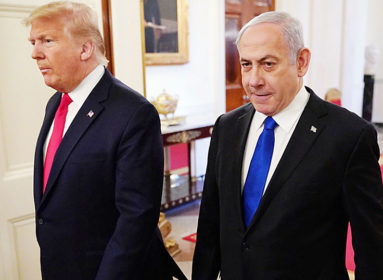The New York Times seems less and less concerned about factual coverage of Israel, as Ethan Bronner’s July 3, 2010 column titled “Setting Sail on Gaza’s Sea of Spin” underscores.
Bronner begins his “news analysis” piece by comparing the latest Gaza flotilla, led by radical anti-Israel extremists and terrorist groups, with the efforts of Holocaust survivors in pre-state Israel to breach the British blockade onboard the Exodus.
The outrageous, false analogy is cast, in the familiar trope of the Times, as the viewpoint of “some” unnamed persons who “see a parallel.” Of course, all kinds of bogus parallels are seen by people; journalists and their editors aren’t obliged to give them credence in print. But many Times reports rely on a ping-pong-like juxtaposition of Israeli versus Palestinian views, a template that ostensibly presents balance but more often ends up as a device to inject inaccurate claims and to avoid the facts.
Similarly, Bronner sees “almost everything” in the flotilla controversy as “a parable for something else, part of an unstated effort to recast the Israeli-Palestinian narrative in extreme terms.”
What all this circumlocution amounts to is the reporter laboring to soften the reality, which is that, manifestly, there is one “extreme” dimension of the “Israeli-Palestinian narrative,” and, more specifically, of the recent flotilla “narrative.” That dimension is the flotilla’s Muslim Brotherhood leadership in the guise of Muhammad Sawhalha, and the Brotherhood’s Gazan arm, Hamas, an organization that seeks the annihilation of Israel and of all Jews – as openly expressed in its charter, public statements, and the training of its youth.
The facts are clear and available; the Islamist component of the latest flotilla is documented. But the Times has never mentioned Sawalha or done any in-depth look at the “extreme” Islamist and terror-related underpinnings of the flotilla. Bronner makes passing comment near the close of his article to the “Turkish group, I.H.H. which helps sponsor” the flotillas and has ties to Hamas. But the reference suggests the journalist hasn’t bothered with homework. As widely reported, I.H.H is essentially uninvolved in this flotilla, its major vessel having dropped out.
Nor does Bronner touch on a noteworthy account in the Dutch press, which revealed that all Dutch journalists and activists had left a flotilla vessel on the island of Corfu when they witnessed the arrival last week of Amin Abou Rashed, a well-known Dutch Hamas leader.
Flotilla leaders also include Huwaida Arraf and Adam Shapiro, International Solidarity Movement founders, the latter of whom recently called for global attack on Israel and termed the flotilla movement part of the third Intifada. But Bronner ignores the ISM radicals too.
And though he says the likelihood of violence “does not seem farfetched,” that declarative statement appears near the close of his piece. In contrast, Bronner opens with the sardonic observation, via reference to unnamed commentators, that “the Israeli authorities portray the organizers as violent Islamists when most are middle-aged European pacifists.”
While all but omitting Islamist, particularly Hamas, involvement in the flotilla – and any reference to Hamas’s genocidal agenda or its decade of rocket assaults on Israel – the reporter offers warmly sympathetic statements about Gaza. Noting that Israel is “quick to say that Gaza is well provided for and doesn’t need any flotilla,” he is quick to interject that “Gaza remains a deeply sad and deprived place.”
He also quotes, and mislabels, a favored NGO, Gisha, a pro-Palestinian group that engages in apartheid rhetoric about Israel. Bronner calls it simply “a human rights group focused on Gaza,” omitting its extreme political tilt. Gisha is cited saying the focus on humanitarian aid is “infuriating and misleading” because progress there distracts from other “sweeping restrictions” on Palestinians.
But beyond the usual devices of Times misdirection and distortion, the opening Exodus theme is what grabs the reader. Bronner returns to it at length, claiming it supports “a certain political and public relations strategy.” An Israeli professor is quoted as saying Palestinians hope via the flotilla to give Gazans a greater hand in defining their own fate as the Exodus did for Jews.
But that same professor, M.M. Silver, has also written: “Such comparisons are, to Israelis, invidious, and they completely undermine faith in ‘land-for-peace’ diplomacy. As they see it, their country conceded land, and then received not peace, but rather missile attacks, insulting Holocaust analogies, and shrill war crime accusations.”
The thrust of Bronner’s work here and in nearly daily dispatches conveys a seemingly irrepressible impulse to mute and distort the openly expressed aims of the Palestinians themselves with regard to Israel, to focus instead on indictments of the Jewish state and to belittle Israeli concerns.
The disparagement is echoed in the bizarre use of, for instance, the word “scuffle” to characterize the attacks on Israelis during the 2010 flotilla crisis. Soldiers were beaten unconscious, stabbed, and thrown off an upper deck, prompting an extensive, violent exchange in which nine flotilla members were killed. (In a previous story, Bronner termed the violent clash a “tussle” – suggesting, say, a pillow fight.)
Bronner’s title alludes to competing Israeli and Palestinian “spin” regarding the flotilla. Ironically, if “spin” means seeking to shape perception of events regardless of facts, Hamas and its allies’ flotilla gambit is matched in this endeavor by the fact-anemic “narratives” of the Times’ Jerusalem bureau chief himself.
Andrea Levin is executive director and president of CAMERA, Committee for Accuracy in Middle East Reporting in America.







 Southern New England Jewish Ledger
Southern New England Jewish Ledger














